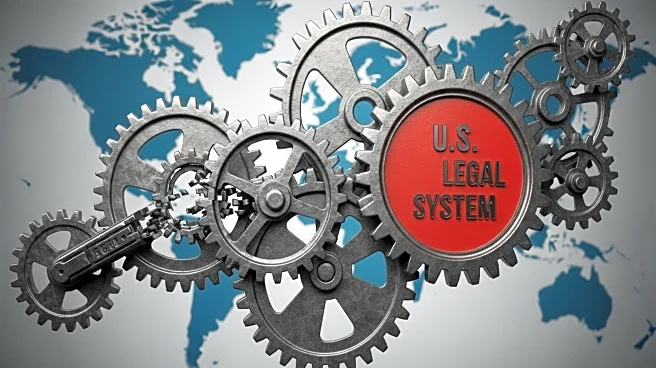What's Happening?
The U.S. Court of Appeals for the Federal Circuit has ruled that President Trump's tariffs, imposed under the International Emergency Economic Powers Act (IEEPA), are illegal due to constitutional limits on executive authority over taxation. This decision has led to significant market volatility, with the S&P 500 dropping by 12.9% as investors move towards safer assets like gold and fixed-income instruments. The ruling challenges the administration's use of IEEPA for tariff imposition, traditionally reserved for Congress. Trump's refusal to accept the ruling and his intention to appeal to the Supreme Court have further compounded market uncertainties. The tariffs have also disrupted global supply chains, imposing an estimated $71 billion in additional costs on U.S. small and medium-sized businesses and accelerating shifts towards localized manufacturing and regional trade agreements.
Why It's Important?
The court's decision underscores the legal and economic implications of executive overreach in trade policy. If upheld, it could necessitate a congressional overhaul of trade policy, potentially leading to higher, legally sanctioned tariffs. Conversely, a reversal might embolden future administrations to exploit IEEPA for similar measures, increasing uncertainty. The tariffs have already fragmented global supply chains, raising production costs and eroding trust in multilateral trade systems. Countries are increasingly prioritizing bilateral or regional agreements to circumvent U.S. policies, which could destabilize the rules-based global trade order. For investors, this means higher operational costs, longer lead times, and greater exposure to geopolitical shifts.
What's Next?
The Supreme Court's upcoming decision will be pivotal in determining the future of Trump's tariffs. If the court upholds the lower court's ruling, it could lead to a congressional overhaul of trade policy. Conversely, a reversal would allow future administrations to exploit IEEPA for similar measures, deepening uncertainty. Economists project stark outcomes either way, with potential long-term GDP declines and income losses for middle-class households if tariffs remain. If revoked, trade negotiations with key partners like China and Mexico could unravel, triggering a new wave of protectionist policies.
Beyond the Headlines
The legal battle over Trump's tariffs highlights the inescapable link between political risk and economic stability. The ruling underscores that executive overreach in trade policy is not only legally contentious but economically destabilizing. As the Supreme Court weighs in, asset allocators must prepare for a world where supply chains are more fragmented, markets more volatile, and geopolitical tensions more intertwined with investment outcomes.









